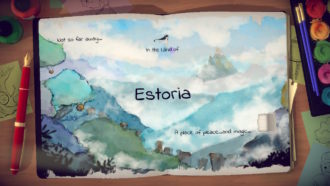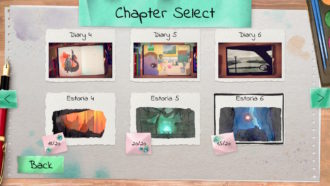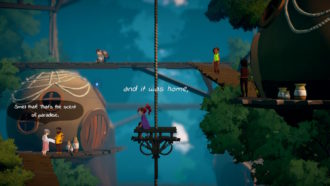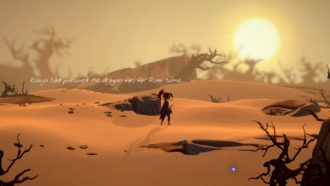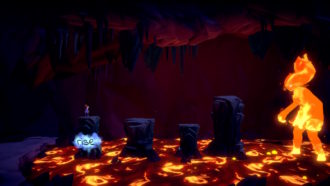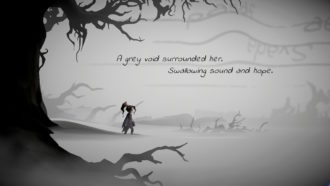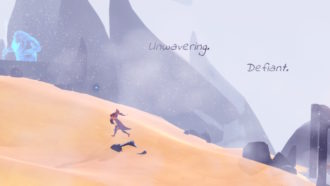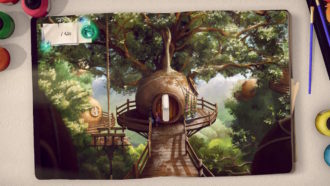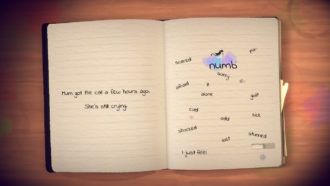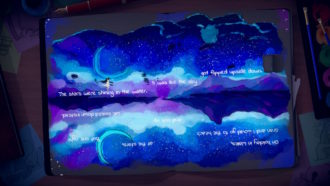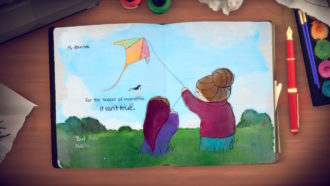Platforms:
Xbox One, PS4, PC, Nintendo Switch,
Released:
April 6, 2021
Publisher:
Modus Games
Developer:
Sketchbook Games
Gran always says: give the world your kindness, and it will return it threefold.
Lost Words: Beyond The Page takes you back to when you were a big kid: those years when you were too young to be a moody teenager, but too old to chew curtains. You might have looked up to your parents (before you found them super embarrassing), or your teachers, or maybe an older sibling. If you were cool like me, you kept a journal and filled it with ideas for fantasy worlds, sci-fi inventions, and violent comic book heroes. Lost Words, however, doesn’t go for a nostalgic trip down your pre-teen years: it’s a narrative adventure that draws you right into someone else’s, and makes you experience them with her.
Lost Words takes place quite literally between the pages of a book. A young girl named Izzy receives a journal from her Gran on her birthday and decides that she is going to write a fantasy adventure story in it. What follows is a blend of real and fictional storytelling, as Izzy chronicles her personal experiences between chapters of her growing novel. As the player, you walk along the pages of the journal in a two-dimensional plane using written words as the ground beneath your feet. There are some simple navigational challenges where you have to use the cursor to drag movable words or objects for a specific effect, such as shifting a sentence to create platforms to jump on or putting the word “open” over a drawing of a closed door. For the most part, you’ll be jumping from page to page just reading and listening to Izzy’s thoughts as they occur, giving the real-world sections of the journal a feeling akin to a traditional “walking simulator” like Gone Home or Firewatch. At the end of each diary section, Izzy lets the player decide on a few details in her fantasy novel, before diving into its world.
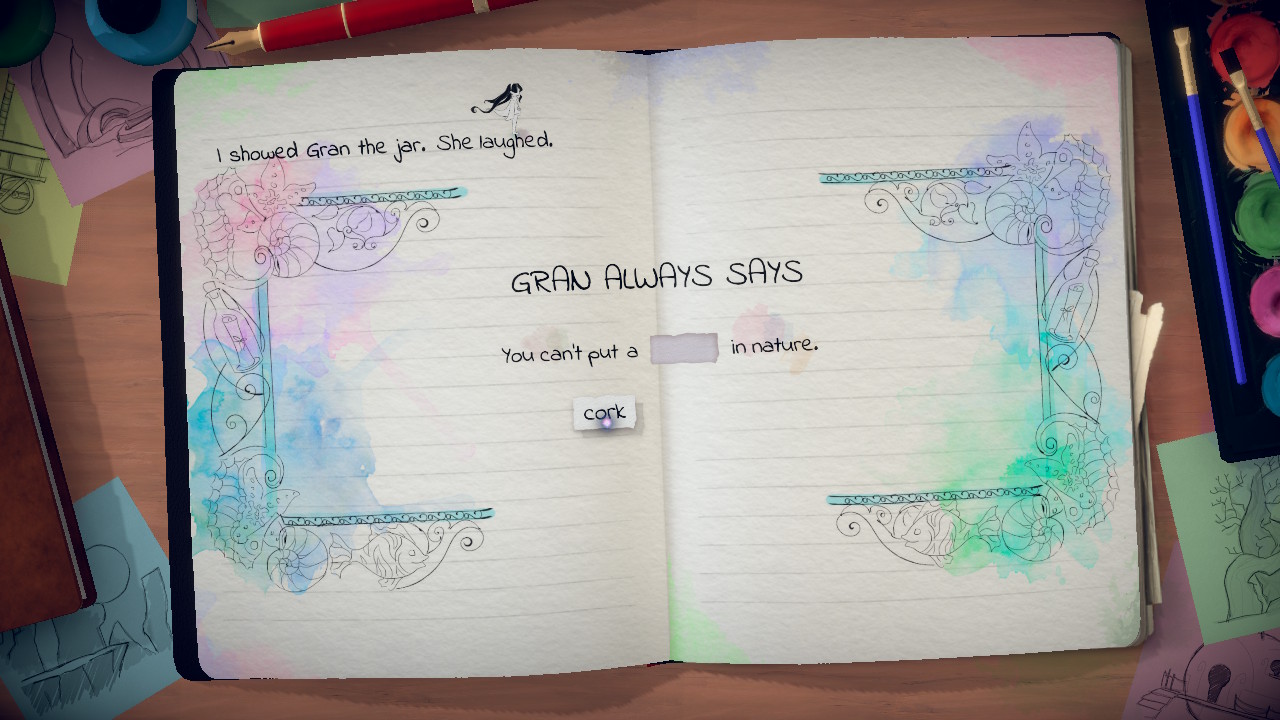
The universe of the novel, named Estoria, is incredibly faithful to how I imagine a young girl’s fantasy world would be. Beginning in a woodland village, the protagonist meets with her mentor Elder Ava, who protects the village by virtue of guarding the mystical fireflies. Soon after, Ava passes on the mantle of firefly guardian and gives the protagonist the ability to control words of power. The village is a charming homeland of rope elevators and friendly townsfolk, which heightens the emotional intensity once a wicked dragon attacks and we see the protagonist’s home destroyed and the fireflies scattered to the winds. While Izzy comes to terms with the distressing events in the real world, the novel’s protagonist chases the dragon across Estoria in search of her fireflies – she travels through a desert haunted by an impetuous djinn, a deep cave system of earth and fire, and a dizzying underwater labyrinth full of secrets. The landscapes are beautifully rendered in a simple, yet vibrant cartoonish style that captures the imagination and imbues the story with Izzy’s personality. You can really sense that Izzy is escaping into this fantasy world both as a distraction from real events and as a vessel for learning to process her emotions.
Gameplay in Estoria controls similarly to within Izzy’s journal, except that you’ll have access to a spellbook that records the protagonist’s words of power. Using the words, you complete simple environmental puzzles such as making pillars rise to create a path or casting repair on a broken bridge. None of these puzzles are particularly taxing and I never found myself stuck, but they do serve to break up the storytelling a little and provide an extra layer of engagement with the world. I would have liked to see some more interaction between the different words other than the occasional binary choice (eg. you’re given an option at one stage to either break or repair a statue). While it’s understandable within the context of the story, there’s definitely room for further development with such a unique idea. There are also numerous fireflies to collect in each chapter of the story that require a bit of extra effort to find, providing some replay incentive.
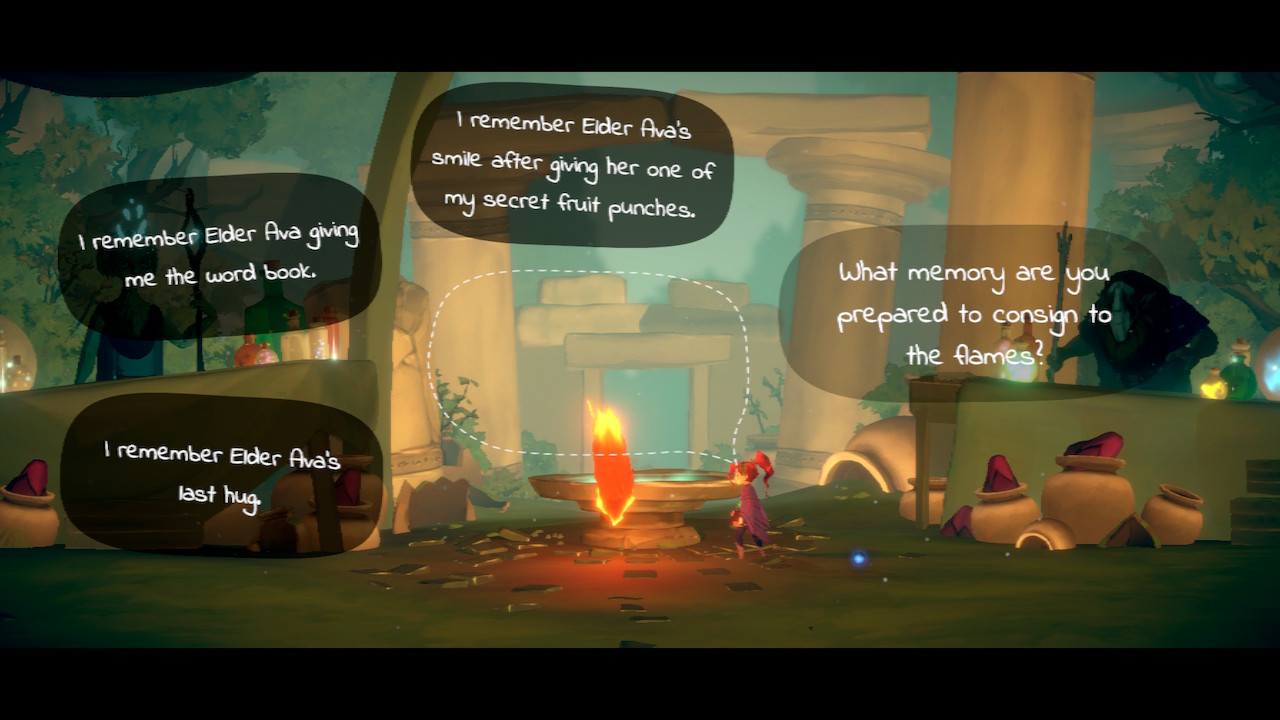
Mechanics aside, Lost Words is really all about its comprehensive narrative. With a name like Rhianna Pratchett attached, it’s no surprise that the storytelling is absolutely, gut-wrenchingly, heart-breakingly perfect. Pratchett has extensive experience in narrative design, having worked on franchises such as Tomb Raider, Bioshock, and Mirror’s Edge, as well as various adaptations of her late father Terry’s extensive catalogue. The literary voice of Izzy is so incredibly strong, powerful, and truthful. Pratchett and the team at Sketchbook Games utilise their medium with precision and artistry, blending the game mechanics, visuals, and language together in gorgeous harmony to create a story that truly needs to be told within a game. There’s something so cathartic, immersive, and personal about wandering the pages of Izzy’s journal, yet you never feel like an intruder – she needs to talk to someone, and as her reader and confidant, you’re invited into her inner world. Lost Words also features full voice acting, and it’s top-notch. In tandem with a devastatingly delicate piano-driven soundtrack, it strikes a chord that both encapsulates Izzy’s childish wonder and allows for her emotional depth and growth.
I’ve deliberately avoided discussing Izzy’s personal journey so far, and I urge you to go and play Lost Words before continuing if you’re interested in experiencing it for yourself. It’s not likely that you’ll feel spoiled on the game’s events, but I feel as though it’s worth venturing into Izzy’s world on your own terms.
So, while I’ve explained a little about the novel’s universe, what’s truly engaging is in how Estoria elaborates on Izzy’s inner world as she copes with events in her life. The game begins when Gran gives Izzy her new journal, and as it progresses we learn more about their family and relationships. Little anecdotes are peppered throughout, giving life and truth to the various characters – we learn about Gran’s extensive marine biology knowledge, Mum’s love of tea, and Dad’s awful pie-making skills. Mundane observations and charming character tidbits are given through stories about Izzy’s day at school and her little brother’s penchant for chewing curtains. Then, the wholesome, uneventful diary project becomes a vital lifeline for Izzy to cope with massive changes in her world. Gran, after suffering from a stroke, gradually becomes sicker. Izzy takes it on herself to be the hero and make her better, but eventually Gran dies during the night. Just like Izzy, the player has to deal with the loss of the colour, joy, and advice she brought to the world, and the guilt of maybe not doing enough to save her. It’s visceral, realistic, and beautifully portrayed through the interactive story: we don’t just see or hear about Izzy’s grief, we experience it with her.
I’ve honestly never felt so punched in the gut by a videogame as I did with Lost Words. Sharing the experience of losing Gran with Izzy is really tough. There were many instances where I had to stop playing for a few moments and have a good cry, especially when parts of the story would remind me of my own grandmothers, and what it felt like to lose them. It’s not a long game: I recommend completing it in a single sitting, like you might settle down with a short novel. But it’s one that will stay with me for a long time. Through the writing, visual storytelling, and gameplay, Lost Words achieves truth in a way that I’ve never experienced before.
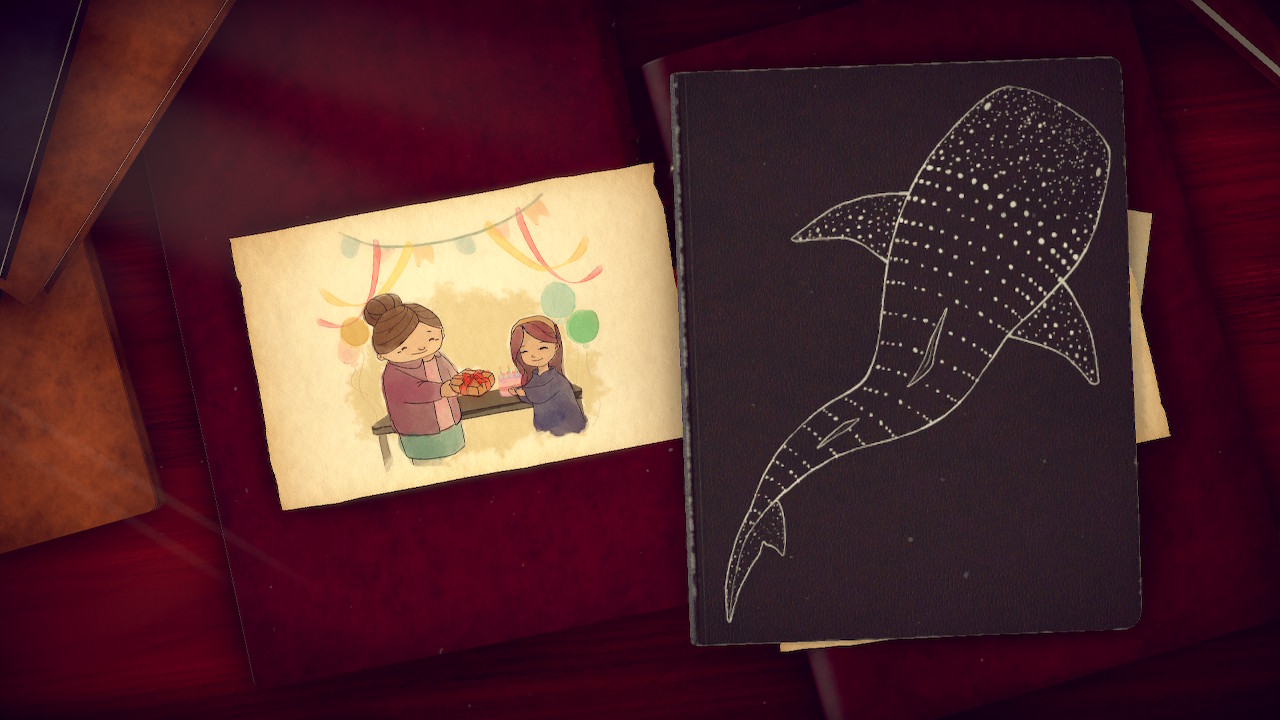
9
Amazing
Positive:
- Gorgeous visual and audio design, with top notch voice acting
- A perfect balance of storytelling through immersive "walking simulator" gameplay
- Fantastic writing, and a beautiful narrative told masterfully
Negative:
- Missed opportunity for more complexity with puzzles
Lost Words: Beyond The Page is an example of storytelling that can only exist through the medium of games, and a testament to the artistry of play. Its powerful writing, eye-watering design, and incredibly truthful narrative are held up by simple intuitive gameplay that immerses you in its story. While it’s not a challenging experience, Lost Words pulls you into an emotional journey that will linger long after the ending credits. This is the kind of game that makes me excited to play games, even if they leave me in tears.
